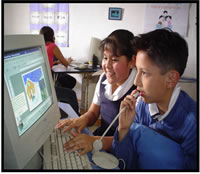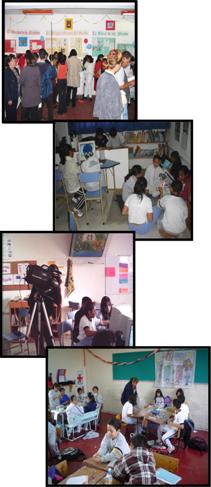MirandaNet presence in the UK and throughout the World
International | Africa | Bangladesh | Chile | China | CzechMiranda | Japan | Macedonia | Mexico | MiraNet | MirandaNorth | Poland | Regional | Romania | Star | Taiwan | Thailand | UK-Japan Science | UK-China Links | USA
 “Learning
Together”
“Learning
Together”
The Creation of Communities of Inquiry Supported by ICT
S.M. Rojas-Drummond*, C.D. Albarrán, M.G. Vega, M. Zúñiga & M. Vélez
Faculty of Psychology, National Autonomous University of Mexico
- Introduction
- General Description of the Programme
- Implementation of the Programme in each Grade
- Conclusions
- Bibliography
I. Introduction
An innovative educational programme is described which has been implemented in public primary schools in Mexico for over six years called “Learning Together”. The purpose of the programme is to form communities of inquiry with the active participation of primary students, teachers, administrators as well as university researchers. All members are encouraged to contribute to the social construction of knowledge. These communities promote functional social, cognitive, psycholinguistic, technological and academic abilities in primary students.
Throughout the six years of implementation, numerous quantitative and qualitative longitudinal research projects have been carried out, which have both theoretical and practical applications. In these projects, we have analysed, among other processes, how children appropriate the target abilities under study over time, as well as the success of the program in promoting them (e.g. Rojas-Drummond, & Mercer, 2003; Rojas-Drummond et al., 2003; Rojas-Drummond & Peón, 2004; Wegerif et al., in press, 2005).
This proposal is based on a sociocultural perspective. This approach assumes that knowledge is jointly constructed when people engage in meaningful activities mediated by a variety of artefacts (e.g. Cole, 1996; Cole, Engeström & Vasquez, 1997; Mercer, 2000; Rogoff, 1990, 2003; Rogoff, Turkanis & Bartlett, 2001; Wells, 1999; Wertsch, 1988, 1991).
Within the mediators that play a central role in our programme are different genres of oral and written language and ICT for a variety of functional purposes. These mediators help to promote the development of “functional literacy” in students, as well as the co-construction of knowledge among all participants. We define “functional literacy” broadly to include the competent uses of written language as well as ICT to carry out diverse meaningful social activities (e.g., Mercer et al., 2003; Littleton & Light, 1999; Wegerif & Dawes, 2004).
Our programme is implemented in parallel with the rest of the school activities. However, the functioning of the former is dramatically different from that of ordinary classrooms in most public primary schools in Mexico. The latter do not provide this rich social learning environment, with only the text book as a source for carrying out exercises, no uses of ICT and where the teacher generally follows very traditional methods which involve mainly directive-transmissional styles of interaction (Mercado, Rojas-Drummond et al., 1998; Paul, 2005).
In contrast, our programme seeks to create communities of inquiry where all members participate actively in pursuing authentic projects and solving a variety of problems. These involve competent uses of functional literacy and have meaningful applications in a wide variety of contexts inside as well as outside of school.
Functional and information illiteracy are very wide-spread among our student population in Mexico, as demonstrated by several international and national studies (e.g. OECD, 2001, 2004). Thus, finding solutions for this problem has become a central target of the Mexican educational authorities and our programme shares these concerns.
[Next section: General Description of the Programme]
[Back]


